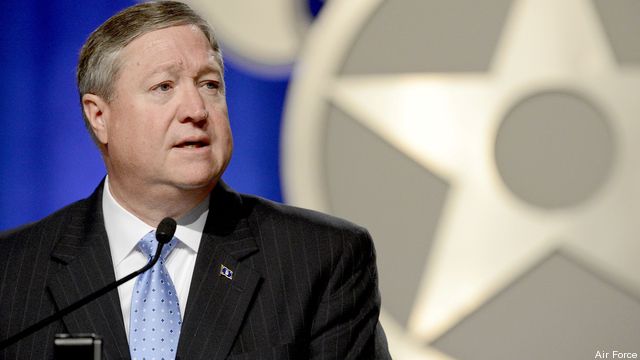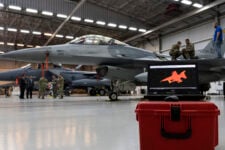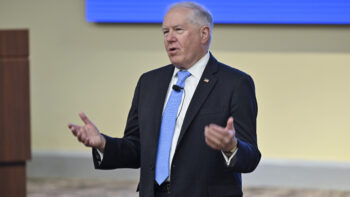
WASHINGTON: Here’s something to raise your hackles, or to Spider Man fans, set your spidey sense tingling. Air Force Secretary Mike Donley told reporters this morning that the budget and strategy talks are “two separate discussions trucking along in parallel.”
“The tension between the need to do something to address the deficit and the strategic environment have been two separate discussions trucking along in parallel,” Donley said when I asked him if and when someone in the Pentagon would resign in the face of the strategic risks being piled up as a result of our hapless course. (He didn’t answer the resignation question, of course.)
“It’s up to the national leadership, I think, to figure out when those streams cross and how to make the right judgements on a the budget plan that fit the strategic realities we might face I can’t tell you exactly when that might happen.” This is a fundamental problem faced by the United States. Budgets are strategy in action but we don’t really have a budget. Instead, we have a series of ad hoc and highly unpredictable actions by Congress and the White House, leaving the Pentagon to hope for better. And we all know how useful hope is as a strategy.
Folks in the Pentagon know this, Donley said at a Defense Writers Group breakfast. “We do recognize in the sequestration that we are adding risk,” he said, adding that “we see the tradeoffs very, very clearly. We are conveying to the national leadership, to the White House and to Congress what those risks are.”
Defense Secretary Chuck Hagel, of course, announced his strategy review — due at the end of May — and the sequestration discussions seem to have been going on since time began. When he signaled the strategy review, Chairman of the Joint Chiefs Gen. Martin Dempsey pointed at sequestration, hybrid war and other global shifts to explain it. But sequestration was the only new factor.
Donley is a thoughtful, precise and publicly cautious man. For him to say publicly that there is a disconnect between strategy and budget caught my attention. It may seem obvious, but almost no one at the Pentagon in a senior position has been willing to make this important point. Instead, they’ve largely said they need a budget to better plan or that deep cuts are bad.
But the increasing uncertainty created by sequestration and the resulting uncertain course of US strategy in the face of this legislation is clearly beginning to sow unease among our senior leaders.
The last word Donley was willing to offer: “It’s important we get to a national level discussion and decision on the way forward to resources for defense.” While it’s still careful and leaves him lots of wriggle room, it’s also a fundamental truth Congress and the White House must act on. There’s been all too little public discussion of just how the Chinese, the Iranians and the North Koreans read our decision in early February to delay deployment of the aircraft carrier USS Harry S. Truman because of sequestration, leaving the fleet with only one carrier in the Gulf region for the foreseeable future. Perhaps that young pup in North Korea turned to his wife and said, “See honey; we can safely taunt the Americans now.”
Jordan’s Abdullah II defends shootdown of Iranian munitions over its airspace during attack on Israel
Amid Iranian criticisim, “Jordanian leaders have been very clear to portray their action as defensive and in protection of their own sovereignty rather than any act in support of Israel, and this is sincere,” an analyst told Breaking Defense.


























